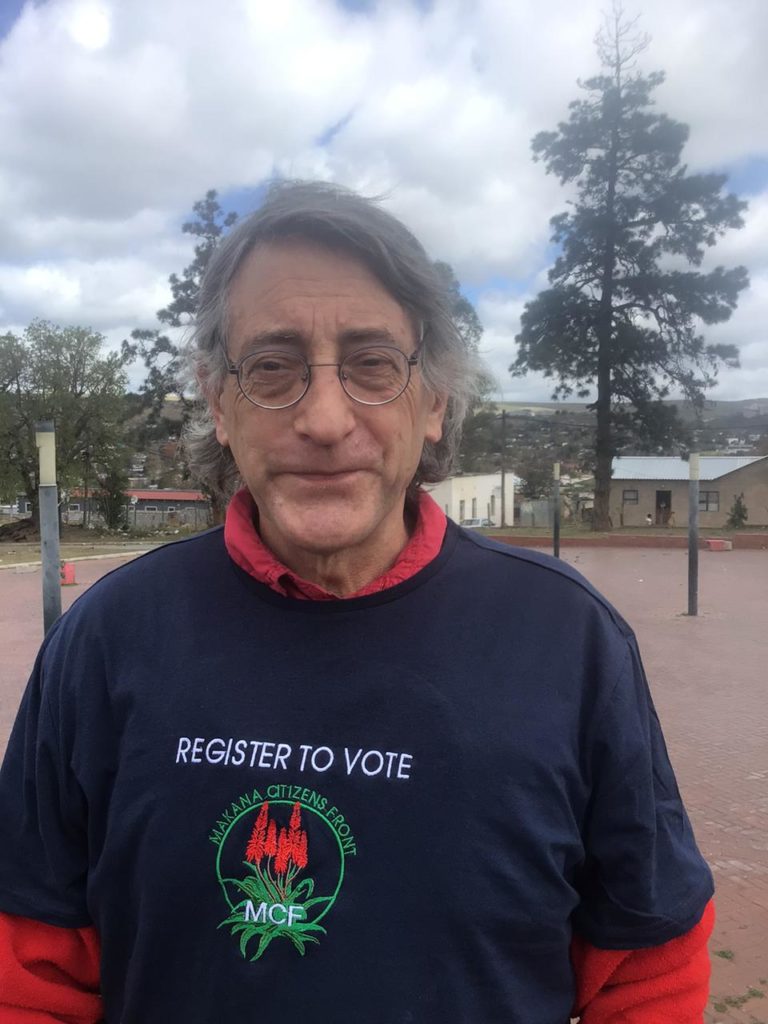By DANA OSBORN
Philip Machanick has been dedicated to bettering the Makhanda community for quite some time. His new challenge is contesting the local municipal elections as the Makana Citizens Front (MCF) Ward 4 candidate.
Machanick is an Associate Professor of Computer Sciences at the University Currently Known as Rhodes, and a former chair of the Makana Residents Association (MRA). He is contesting the election separately from the MRA, as it is a non-partisan organisation.
However, in this role as MRA chair, Machanick said he had “been in a position to get a clear grasp on the service delivery issues”. The MRA did this by interacting with the Government positively through meetings, writing letters, and organising petitions when those strategies failed.
Machanick referenced the UPM 22 000 signature petition to dissolve the council under Section 139 of the Constitution, which states that a municipality may be placed under administration if it is in a serious or persistent material breach of its obligations. Although this was a UPM initiative, Machanick explains that he and many others gathered evidence for the campaign.
Another example of legal action, which the MRA participated in, involved a settlement with Eskom in 2019 after they threatened to turn off Makhanda’s electricity for large periods of each day due to a R90-million debt. Machanick explained, “If we think the water situation is bad now, then imagine possibly half a day or more of no electricity to the water plant. It would be even worse.”
“This is the background I bring into the campaign. If I am in council, I’m in a position to ask the right questions. One of the first things I would do is insist on taking a high-level delegation to Amatola Water and find out what is going on with this project,” Machanick said, referring to the project to double the capacity of James Kleynhans Water Treatment Plant, which was due to be completed at the end of 2017.
Machanick pointed out several examples where people and resources are not being used efficiently. “There are these unexplained sudden flurries of activity that happen, sometimes at great expense yet things that people actually want to be done like fixing potholes, sewer leaks, water leaks, RDP houses and so on are just not happening – so, it’s the municipality that out of control. We need people in City Hall asking these questions.”
Machanick explained that he joined MCF instead of one of the “conventional parties” because the other parties have been sitting in council, and nothing has been done. “I do believe that DA is putting up some good candidates this time around and strength to them – but why does this have to be an unusual thing?”
“There is a lot of anger in the community, and we have to talk to the people and address the causes of this anger.” He highlighted the Makhanda service delivery protests and three-day shutdown that happened earlier this year, explaining that “MCF grew out of that protest. I was at Soccer City otherwise known as Fingo Square for some of the meetings. I got the opportunity to look someone in the eye as they said, ’27 years we’ve been promised a better life’, and you can see the pain and betrayal in that person’s eyes. Even if I come from a different background I can understand that this is a problem.”
“I think one of the things which are really powerful about the MCF is that it’s grown out of these community-based protests and civil society organisations. It doesn’t directly represent any of them, they are more like external allied formations but I think this makes for a much better relationship between civil society and City Hall if the two are not seen as if in competition.”
MCF has recently released their Code of Conduct to the public, which includes a clause which states, “Should 100 voters from my constituency (ward, for ward councillors, all of Makana for PR councillors) sign a well-motivated petition for me to step down, the management committee shall convene a disciplinary committee that provides a fair process and I will resign my seat if this process supports the community recall position.”
Unlike the 22 000-signature petition to recall the council driven by the UPM in October of 2018, which was basically ignored, MCF is putting the power in the hands of the people and allowing them to recall a councillor given 100 people sign a well-motivated petition.
“I don’t know of any other organisation that does that, so I think that’s a significant change. In addition to the fact that all the control is here, there isn’t a party head-office in East London or Joburg.”
Machanick said the MCF’s key focus is on speaking to constituencies and finding out from the people what needs to change, which is what he plans to do with Ward 4.
He said we have one of the best constitutions globally, which advocates for equality, yet we are a highly unequal society. From his perspective, the first step towards narrowing that gap between constitution and reality is “looking at the fundamental derogation of rights,” stating that “these are the things you shouldn’t have to fight for.
“In that way, you could say that MCF is a civil rights movement because we are fighting for really basic rights.”
“I want to appeal to people who use Facebook to follow us there and talk to us. We want to hear from you, the comments on the articles we post are in some cases more important than what we say ourselves.”


